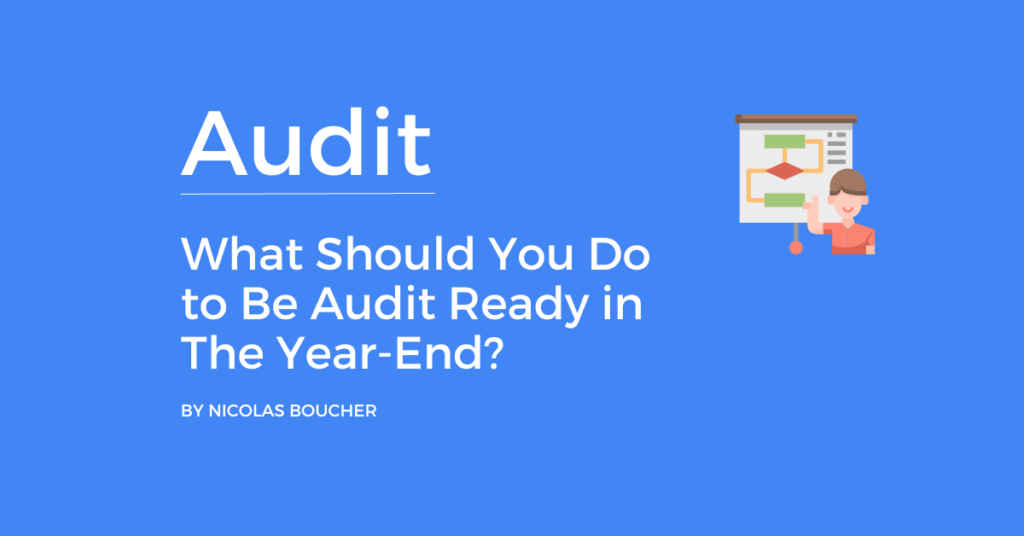Why is it important to be audit ready? Your year-end closing activities are finally done, but now start another interesting and demanding part: the year-end audit! If not planned ahead of time, accounts preparation can be a demanding and exhausting undertaking.
Internal auditing is not the responsibility of the accounting team; instead, other departments are required to help by supplying all the vital records for financial reporting. What can you do to be audit ready?
What Is Year-End Audit?
A third-party auditor evaluates the accuracy and dependability of the finalist’s accounts throughout the year-end audit process. The external auditor looks through the financial information and confirms it by comparing it to the supporting records.
They strive to understand the accounting policies and procedures the firm implemented as well as how well the financial records matched these policies. Also, the auditors monitor the financial accounts to assess the company’s financial standing and its performance in relation to the organizational objectives.
How To Be Audit Ready
As the audits are starting and adding pressure on finance teams, it’s important to remind ourselves of the importance of the preparation for an audit. The audit process can be a stressful and time-consuming experience, but with the right preparation and communication, it can be a smooth process.
Based on my experience from both sides (auditor and being audited), here are ten practical pieces of advice on how to prepare and be audit ready and how to manage an audit if you are the main point of contact.
#1: Understand The Process in Order to Be Audit Ready
Familiarize yourself with the audit process and the expectations of the auditor. This will help you understand the auditor’s questions and requests. Organize a meeting prior to the audit to understand the audit planning, the focus of the audit, and how the auditor works. Clarify what will be the communication channels, which documents they need, how to deliver documents, which are the points of contact, and agree on an escalation process in case of issues.
#2: Get Organized
Gather all the necessary documents and records well before the audit. This includes schedules supporting each significant balance of your trial balance, documentation for significant events, invoices, month-end checklist, manual journal entries documentation, balance sheet reconciliations, and any other supporting documentation which was asked in the past. Having everything in one place will save time and reduce stress during the audit.
If you are new to the audit process, make sure your organization has a way to keep all bank statements, invoices, receipts, and other financial records in a labeled and organized manner.
#3: Learn from The Past
Audit findings from previous years can be a valuable tool to help prepare for the next audit. Review any areas where the auditor identified issues or deficiencies and make sure to address them in the current year. Use the feedback from the auditor to improve your internal controls, financial reporting, and overall compliance.
#4: Communicate Effectively during The Audit
Clearly communicate with the auditor, and make sure to ask any questions you have. The auditor’s job is to provide an objective opinion on the financial statements. FIt’shat, they need to have an understanding of your figures and obtain enough comfort and audit evidence to be able to validate your accounts. They should also be willing to explain their findings to you.
If you are unsure about a question the auditor has asked, ask for clarification, and if you disagree with the auditor’s conclusion, present your own evidence and reasoning. Get ready to provide clear and concise answers to the auditor’s questions. It is important to provide evidence to support your responses and to follow up on any requests for additional information. It’s important to react in a timely manner to avoid any bad surprises on both sides.
#5: Be Transparent in Order to Be Audit Ready
Be honest and open with the auditor. If there are issues or discrepancies, it’s better to bring them up yourself rather than have the auditor discover them.
#6: Keep Records of The Audit
Keep records of all communication and correspondence with the auditor, including any documents provided and any agreements made. This will be useful for future reference if there are questions to clarify. For example, keep an audit log that contains notes of all meetings, phone calls, and emails with the auditor, as well as documents provided.
#7: Areas of Focus
Auditors will typically focus on several key areas of your financial statements. Such as cash and cash equivalents, accounts receivable, inventory, property, plant and equipment, revenue, provisions, accounts payable, and accrued expenses.
In order to be audit ready for each of these topics, make sure that you have proper documentation everywhere where you booked a transaction based on management judgment (for example, impairment).
#8: Significant Transactions and Events
You will need to do a preparation for deeper reviews of significant transactions and events that occurred during the year. Such as mergers and acquisitions, disposals of assets, and significant financing transactions. For each topic, ensure to have appropriate documentation which shows the way you record these events in your financial statements. Don’t wait for the audit to have your documentation ready. For smaller transactions, I suggest having a memo or an email summarising the situation and how it was recognized in the books. For more significant events, make sure you have a management presentation. The presentation will serve as a management memo and a piece of evidence that the management level approves.
#9: Allocate tasks to Be Audit Ready
To ensure that the audit process runs smoothly, it’s important to allocate tasks and responsibilities amongst your team. Take your financial statements and allocate a team member for each line item. Then add nonfinancial topics like internal controls, significant events, market updates, etc. Also, you can allocate the preparation tasks. One team member can be responsible for gathering all the necessary documents. While another can be in charge of communicating with the auditor. This will help keep everyone organized and on task.
#10: Leverage The Work for Other Types of Audit (Internal Audit or Tax Audit)
Bear in mind that an external audit is not the only audit you might have to prepare for. To avoid having to spend the same efforts for internal audits or tax audits, make sure to have your documentation and the results of your work prepared in a matter that you can reuse for any other requests.
Bonus
At the end of the audit, organize a lessons-learned meeting with your auditor. The reason for this is to understand what worked well and what to change for future audits. This is something I used to do as an auditor with my clients. Therefore, the results of this meeting will help you have smoother audits in the future.
Conclusion – Follow The Advices to Be Audit Ready at Any Time!
By following these ten pieces of advice, you’ll prepare yourself better for an audit and be able to communicate effectively with your auditor. Remember, the goal of the audit is to provide an unbiased assessment of the financial statements, so by working together, the audit can be a valuable tool for improving the financial health of your organization. I hope this will help you have a smoother audit and that you will be audit ready!

